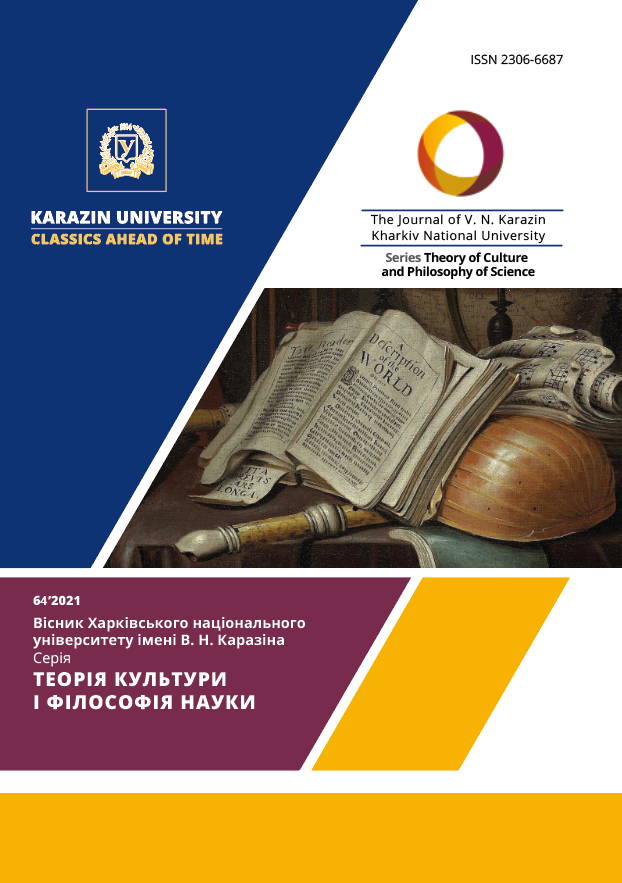ДО ПРОБЛЕМ ПОСТКОЛОНІАЛЬНОГО ФЕМІНІЗМУ (НА ПРИКЛАДІ ФІЛІППІН)
Анотація
Стаття присвячена дослідженню проблем постколоніального фемінізму на Філіппінах і окресленню питань, які потребують створення окремої програми, що розходиться з програмою теоретиків першопрохідців постколоніальної критики (Е. Саїда, Г. Бгабги, Г. Співак ін.). Проблематика статті полягає у малодослідженості постколоніального фемінізму. На прикладі Філіппін показана наукова обмеженість локальними статтями, проте, існує нагальна необхідність актуалізувати цілісне поле гострих питань у житті філіппінців і філіппінок, на які сьогодні найбільше сфокусована феміністська критика. Актуальність статті обумовлена інтересом до розвитку фемінізму на Філіппінах – у постколоніальній країні, яка подвійно постраждала від колоніальної політики Заходу і панування Америки, і яка мала матріархальну культуру у доколоніальні часи. Мета статті полягає в аналізі проблем, ідей і стратегій постколоніального фемінізму на Філіппінах з точки зору постколоніальної філософії і гендерної теорії. Авторки аналізують соціальні проблеми у житті філіппінців і філіппінок, серед яких: невирішеність жіночих проблем усіх соціальних ланок і ЛГБТІК‐спільноти, секс‐туризм і проституція тощо. Також проаналізовано культурне підґрунтя гендерних уявлень на Філіппінах і віднайдено причини недовіри філіппінців до західної критики патріархату у штучному нав’язуванні патріархату іспанськими завойовниками за часів колоніалізму. Розглянуто парадоксальність проблемного становища ЛГБТІК‐спільноти на Філіппінах, оскільки філіппінське суспільство має ненасильницький і негомофобний характер, що пояснює фігура бабайлана – трансгендерної жінки або фемінного чоловіка‐шамана, відомого ще у доколоніальні часи. Окрім цього авторки докладно розбирають проблеми секс‐туризму, проституції, покинутих дітей від «білих чоловіків», які не тільки є збереженими формами колоніалізму на Сході, що втілюють модель символічних відносин між Заходом і Сходом як відносин між домінуючим і підпорядкованим, а і вже перетворилися у соціальні проблеми, що потребують урегулювання з боку влади. Новизна дослідження полягає у спробі віднайти взаємообумовленості між історико‐культурними особливостями, гендерними уявленнями і стратегіями постколоніального фемінізму на Філіппінах.
Завантаження
Посилання
Bernstein,Richard(2015).TheEast,theWest,andSex:AHistoryofEroticEncounters(transl.fromEnglishT.Azarkovich,originalworkpublished2009).Moscow,AST.336p(InRussian).
Bhabha,K.Homi(2005).TheLocationofCulture.In:Intersections(ed.byV.Dunaev,No3‐4,pp.161‐191;original workpublished1994).Minsk,ODO“Novaprint”.(InRussian).
Introduction into Gender Studies (2001). (ed. by Iryna Zherebkina, Part 1. Manual). Kharkov, KСGS;Saint‐Petersburg, Aletheia. 708 p. (In Russian).
Marceniuk Tamara (2018). Why one should not be afraid of feminism. Kyiv, KOMORA. 326 p. (In Ukrainian).
Said, Edward (2012). Culture and Imperialism (transl. from English A. Govorunov; original work published 1976). Saint‐Petersburg, Vladimir Dal. 738 p. (In Russian).
Said, Edward (2005). Orientalism. Western Conceptions of the Orient (transl. from English; original work published 1978). Saint‐Petersburg, Russian world. 636 p. (In Russian).
Spivak, Gayatri (2001). Can the Subaltern Speak? In: Introduction to the Gender Studies (Part 2. Chrestomathy, рр. 649‐670; original work published 1988). Kharkiv, KCGR; Saint‐Petersburg, Aletheia. (In Russian).
Stavrakakis, Yannis, Chrysoloras, Nikos (2008). (I Can't Get No) Enjoyment: Lacanian Theory and the Analysis of Nationalism. In: Gender Studies (ed. by Iryna Zherebkina, № 18, рр. 242‐265; original work published 2006). Kharkiv, KCGR. (In Russian).
Foucault, Michel (1997). The Will to Knowledge. In: The History of Sexuality (transl. from French, Vol. 1; original work published 1976). 235 p. (In Ukrainian).
Aguilar, Delia (1995). Toward a Reinscription of Nationalist Feminism. In: Review of Women’s Studies (Vol. 4. № 2. pp. 1‐14). Retrieved from: https://journals.upd.edu.ph/index.php/rws/article/view/3142/2949. (In English).
Arnado, Janet M. (2008). Women's Emancipation in the Philippines: A Legacy of Western Feminism? In: Globalization and its Counter‐forces in Southeast Asia (ed. T. Chong, pp. 296‐312). Singapore: Institute of Southeast Asian Studies. (In English).
Biana, T. Hazel, Leni, dIR Garcia, Ninotchka, Mumtaj B. Albano (2021). Beyond the bump: Reconceiving the philosophy of pregnancy. Philosophia: International Journal of Philosophy (PIJP) (Vol. 22, 1: 2021, pp. 19‐34). DOI.org/10.46992/pijp.22.1.a.2. (In English).
Cullen, Shay (2019). The curse of sex tourism. Asian Catholic Dioceses Directory. UCA News. Retrieved from: https://www.ucanews.com/news/the‐curse‐of‐sex‐tourism/85252#. (In English).
Leonardo Estacio Jr., Jan Zsanila Estacio, Rowalt Alibudbud (2021). Relationship of Psychosocial Factors, HIV, and Sex Work Among Filipino Drug Users. Sexuality Research and Social Policy (Vol. 18, issue 4, pp. 933‐940). DOI.org/10.1007/s13178‐021‐00563‐0. (In English).
Neil Garcia, J. (2004). Male homosexuality in the Philippines: a short history. IIAS Newsletter (№ 35,May 8). Retrieved from: https://web.archive.org/web/20150508011150/http://www.iias.nl/sites/ default/files/IIAS_NL35_13.pdf. (In English).
Hega, Mylene D., Alporha, Veronica C., Evangelista, Meggan S. (2017). Feminism and the Women’s Movement in the Philippines: Struggles, Advances, and Challenges. PasigCity, Friedrich‐ Ebert‐Stiftung – Philippine Office. 28 p. Retrieved from: https://library.fes.de/pdf‐ files/bueros/philippinen/14072.pdf. (In English).
Jacobsen, Scott Douglas, Hill, Danielle Erika (2019). Empowerment in Progress: Feminisms in the Philippines from the Pre‐Hispanic Period to the Duterte Regime (Part I). Humanist Voices. Official Secular‐Humanist publication by Humanist Voices. Retrieved from: https://medium.com/humanist‐voices/empowerment‐in‐progress‐feminisms‐in‐the‐ philippines‐from‐the‐pre‐hispanic‐period‐to‐the‐duterte‐c69a0bc3676d. (In English).
Ladrido, Portia (2017). What is the future of LGBTIQ rights 19.
In Southeast Asia? CNN Philippines. Retrieved from: https://cnnphilippines.com/life/culture/2017/11/10/asean‐sogie‐report.html. (In English).
Mark GWA (2019). Sex Tourism in the Philippines: A Basis for Planning, and Policy Making and Amendments. J Tourism Hospit (8:416, pp. 1‐12). DOI: 10.35248/2167‐0269.19.8.416. (In English).
Mill, John Stuart. On Liberty (2011) (with an introduction by W. L. Courtney, LL.D., The Walter Scott Publishing Co., Ltd.; original work published 1859). The Project Gutenberg EBook. Retrieved from: https://www.gutenberg.org/files/34901/34901‐h/34901‐h.htm. (In English).
Nads, Esteva (2019). The women who helped shape Philippine feminism. CNN Philippines. Retrieved from: https://cnnphilippines.com/life/culture/2019/3/14/The‐women‐ who‐helped‐shape‐Philippine‐feminism‐.html?fbclid=IwAR2eMQHKXA57tsY‐ brSHNtWmna5eZVV3j3fNDk6MkCJydAIEWyNyIwLLfBQ. (In English).
Redfern, Corinne (2019). In Philippine red-light district, an uphill struggle to battle trafficking and abuses. The Washington Post. Retrieved from: https://www.washingtonpost.com/world/asia‐ pacific/in‐philippine‐red‐light‐district‐an‐uphill‐struggle‐to‐battle‐trafficking‐and‐ abuses/2019/11/17/43a6470a‐bad3‐11e9‐b3b4-2bb69e8c4e39_story.html. (In English).
Sik Ying Ho, Petula, Jackson, Stevi (2021). Locating sexual politics and gendered lives: East Asian perspectives. Journal of Gender Studies (Vol. 30. Issue 5. pp. 503-511). DOI.org/10.1080/09589236.2021.1930179. (In English).
Tacon, Dave (2015). Philippines’ generation of sex tourism children. Al Jazeera. Retrieved from: https://www.aljazeera.com/gallery/2015/3/12/philippines‐generation‐of‐ sex‐tourism‐children. (In English).
Umali, Jastin (2021). Women’s Suffrage: How the Filipina Won the Right to Vote. Esquire Mag. Retrieved from: https://www.esquiremag.ph/long‐reads/features/womens‐suffrage‐philippines‐ a2212‐20210505‐lfrm. (In English).
Women in the Philippines: Inspiring and Empowered (2021). Asia Society. 2021. Retrieved from: https://asiasociety.org/philippines/women‐philippines‐inspiring‐and‐empowered. (In English).
Zafft, Carmen R., Tidball, Sriyani (2010). A Survey of Child Sex Tourism in the Philippines. In: Second Annual Interdisciplinary Conference on Human Trafficking. Retrieved from: https://digitalcommons.unl.edu/cgi/viewcontent.cgi?article=1021&con text=humtrafconf2. (In English).
Цитування
Women’s Role in F. Sionil Jose’s Select Short Stories
Edria Stephanie Nicole, Cristobal Kyla, Gabila Celine Joy, Montealegre Laila, Nueva Cherey, Tud Karen & Hero Jesson (2025) Psychology and Education: A Multidisciplinary Journal
Crossref




